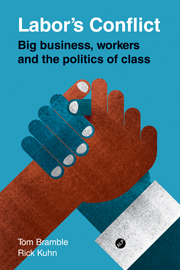Book contents
- Frontmatter
- Contents
- Preface
- Introduction
- 1 Labor's love's lost?
- 2 In the beginning: Labor's first quarter century
- 3 Between the Wars
- 4 Hot war, cold war, split
- 5 Labor after 70 years
- 6 The Whitlam era
- 7 Economic rationalism under Hawke and Keating
- 8 Labor in the wilderness
- 9 The Rudd–Gillard government
- 10 The Labor Party today: what's left
- Notes
- Index
7 - Economic rationalism under Hawke and Keating
Published online by Cambridge University Press: 10 January 2011
- Frontmatter
- Contents
- Preface
- Introduction
- 1 Labor's love's lost?
- 2 In the beginning: Labor's first quarter century
- 3 Between the Wars
- 4 Hot war, cold war, split
- 5 Labor after 70 years
- 6 The Whitlam era
- 7 Economic rationalism under Hawke and Keating
- 8 Labor in the wilderness
- 9 The Rudd–Gillard government
- 10 The Labor Party today: what's left
- Notes
- Index
Summary
The Hawke Government has proved itself to be, not only a great reform government, but a government in the highest traditions of Labor reform. It is a Labor Government not only in the true tradition; it is a government restoring and renewing, strengthening and entrenching the best traditions of Labor reform.
Neville Wran, 1986 John Curtin Memorial LectureIf the Whitlam government is upheld by many ALP supporters as the shining example of postwar social democracy, the Hawke and Keating governments evoke a much more ambiguous response. There are their defenders, such as former New South Wales Premier Neville Wran, and there are those, such as long time ALP member and academic Graham Maddox, who lamented in his 1989 book The Hawke Government and the Labor Tradition that Hawke
gladly presided over an economy in which, as the fortunes of our richest people rose and fell by hundreds of millions of dollars and entrepreneurs made millions in overnight deals, real wages continued to decline, poverty traps closed sharply over the unemployed and the employed poor and propertyless pensioners despaired over an inadequate subsidy.
Then there is the fact that, between them, Hawke and Keating won five successive elections, a Labor record. Set against that achievement is the stunningly low Labor vote in 1996, when the Party lost office with its lowest primary vote in 65 years.
- Type
- Chapter
- Information
- Labor's ConflictBig Business, Workers and the Politics of Class, pp. 104 - 125Publisher: Cambridge University PressPrint publication year: 2010



